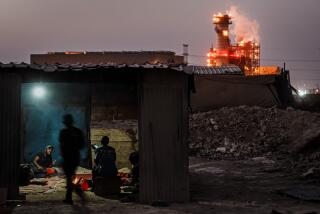Nomadic past is a strike against some in Kuwait
- Share via
KUWAIT CITY — Nasser has lived in Kuwait all his life but cannot call it home. Poor and frustrated, he is one of 100,000 people in this oil-rich Persian Gulf state who are refused what they believe is their birthright: citizenship.
Without it, they can’t work, get the free education and medical care available to citizens, own property, or register marriages, births and deaths.
“Our lives are frozen. All we do is think and think,” said Nasser, 24, who declined to give his surname for fear that a government that won’t recognize him could still harass him. “I want to get married. I want a car. I want money.”
Kuwait, an important Arab ally of the United States, has about 2 million foreigners living on its soil, workers and businessmen drawn by its oil wealth. Its 1 million citizens enjoy generous lifetime benefits. But the generosity doesn’t extend to the bidoun -- Arabic for “without,” as in “without nationality.”
The bidoun blame their nomadic ancestors who, unfamiliar with concepts like “borders” and “citizenship,” never signed up for Kuwaiti nationality before the country became independent from Britain in 1961. But the government believes that many are in fact nationals of neighboring countries claiming to be stateless in order to become Kuwaitis.
Further muddying the waters are Kuwaiti suspicions that bidoun collaborated with Saddam Hussein’s army when it invaded in 1990.
The Kuwaiti government says it is working to solve the problem. Campaigners say it should try harder, warning that destitute bidoun could turn to Islamic militancy.
Lawyer Mubarak Shimmiri calls the situation a “bomb waiting to explode” and is part of a group trying to draw up legislation to resolve it.
“Jobless and hopeless young men are becoming more susceptible to terrorist recruiters,” he said. Two bidoun were sentenced to life in prison this summer after being convicted of joining a terrorist group that planned to attack U.S. soldiers.
The government has responded with a committee to scrutinize citizenship claims, but the process is slow: By April, 11,675 bidoun had been naturalized.
The bidoun say their ancestors, freely roaming the deserts of Kuwait, Iraq and Saudi Arabia, often had little use for citizenship. “Our grandfathers who lived in the desert were negligent,” Nasser said.
Until the 1980s, bidoun received the same benefits as Kuwaitis. But then the government cut off the benefits and began treating them as illegal immigrants. Convinced the bidoun secretly had other nationalities, officials pressed them to own up and accept legal foreigner status. Most held out for citizenship.
“I am only asking for what is rightfully mine, a nationality for me and my children,” said Saad Otaibi, 42, a bidoun who suffered shrapnel wounds fighting on Kuwait’s side of the 1991 war.
Bidoun were the backbone of Kuwait’s military at the time of Iraq’s invasion, since the army was one of the few jobs open to them. Since then, however, the military has barred their recruitment because of suspicions that some harbor Iraqi loyalties.
Lately the predicament of the bidoun has received unprecedented attention.
A July report by U.S.-based Refugees International said they live in “virtual exile” and are “relegated to a bureaucratic no man’s land.”
Late last year, Kuwaiti human rights activist Ghanem Najjar rallied 5,000 bidoun, giving them a rare opportunity to speak about their plight. He called the government’s policy “immoral, unconstitutional and unsuccessful.”
Another outspoken critic is Sheika Awrad al Jabbar al Sabah, daughter of Kuwait’s late emir. Known as “the mother of the bidoun,” she lobbies for them and raises money to send their children to private schools. “These people have to be given their civil rights immediately, whether they qualify for citizenship or not,” she said.
Many bidoun live in shantytowns and are dependent on charity for food.
Abu Akeel, who sells produce from a pickup truck, has been repeatedly arrested for having no license.
“But it is much better than stealing,” he said. “I beseech our government to have mercy on us. We have no other country to go to.”
More to Read
Sign up for Essential California
The most important California stories and recommendations in your inbox every morning.
You may occasionally receive promotional content from the Los Angeles Times.












